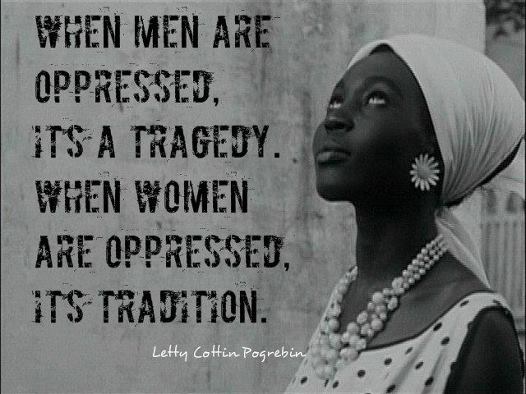When the Qur’an responds to women claims…
The study into the circumstances of the Qur’an’s revelation, also referred to as asbab al-nuzul, unveils the involvement of women within the historical context of the revelation of several Qur’anic verses. This is borne out in the following verse:
“For men and women who are devoted to God – believing men and women, obedient men and women, truthful men and women, steadfast men and women, humble men and women, charitable men and women, fasting men and women, chaste men and women, men and women who remember God often – God has prepared forgiveness and a rich reward.” Qur’an 33:35
Concerning the causes of the revelation of this verse, the commentaries of exegesis relate several versions whose meaning and content are similar but which differ over the characters involved. The most common interpretation is that reported by Tabari concerning Umm Salama the wife of the Prophet. .According to this version, Hind bint Abi Umayya, better known as Umm Salama, is reported as having once said to the Prophet, “Why are we women never mentioned in the Qur’an as men are?” On the same day, during the Zuhr prayer, the Prophet announced from the height of his minbar: “O all of you – ya ayyuha nnas – here is what God says in His Qur’an…” [1] He then disclosed the revelation of the verse. According to another variant, Umm Salama instead asked, “Why are men mentioned at every occasion and not us women?”[2]
Yet another version by Ibn ‘Abbas relates that it was the wives of the Prophet, without mentioning any one of them in particular, who asked: “Why does God mention male believers and not female believers?” Some exegetes attribute this comment not to the Prophet’s wives but rather to other women of the Muslim community, while others cite Asma bint ‘Umays, who after returning from Abyssinia – modern-day Ethiopia – asked the Messenger’s spouses if God had revealed anything in their favour. Apparently she was alluding to those who, like her, had emigrated from Mecca to this African land. Confronted with the negative response of the Prophet’s wives she went to find him and said, “We women, are really afflicted by what is happening to us!” and the Prophet responded, “But why?” “Because we are not mentioned in the Qur’an as men are!” she told him.[3]
Another relatively well-known version attributes the claim to Umm Ammara al-Ansariya who supposedly said to the Prophet: “I can see that everything favours men and that women are hardly mentioned by the divine words!”[4]
Despite the divergence amongst scholars over the authorship of this feminine request, it is nonetheless clear that its content remains the same. These women were expressing their foremost dissatisfaction to the Prophet, (concerning a Qur’anic discourse that appeared – in their eyes – to ignore them. Moreover, given the various existing sources concerning this story, it is highly likely that it was not one but several women who articulated the same resentment.
This attitude is revealing of the mindset of the Muslim women of the era. Their commitment to the path of faith was as much if not stronger than men’s and, without hesitation, led them to demand a more pronounced pledge of fairness from the Creator.
They wanted an equality transcribed for eternity in the sacred Text even though they were acutely aware that the Qur’anic discourse, through its neutral masculine tone, concerned them as much as men. However, and as though they had felt prejudiced against at a given moment in history, they wanted to express their dismay openly and publicly before the entire community with the clear intention of reasserting a position of equality.
This is undoubtedly a protest discourse of a feminist nature. To demand rights on the same grounds as men, denoted the birth of a new female consciousness that refused to content itself in being assimilated into the general concept of believer and instead demanded distinct recognition in due form.
One is frankly surprised by the bravery of these women who did not hesitate in seeking from the Prophet of Islam , the same recognition as that naturally granted to men. Their concern was expressed, need it be specified, in the form of a formal criticism. These women, who were almost certainly spiritually enlightened to be capable of expressing such comments, were clearly questioning the revelation.
They acted in this manner, simply because the divine revelation, while shaping them spiritually, had also fostered within them the freedom of expression.
The same revelation had taught them that they were human beings who were born free and that no other submission but the submission to God could ever be accepted in Islam. This same revelation had taught them to behave as responsible and autonomous beings; human beings free to express their disapproval, to protest and to demand in the name of their faith. And in the name of these principles they criticized what they perceived as a somewhat masculine connotation of the sacred Text; a reproach that emanated from their deep conviction in divine justice!
Could one ever imagine such a scenario in contemporary Muslim societies without prompting a clamour of protest or worse still inflammatory accusations? Could it even be conceivable in this day and age when the simple step of engaging in religious debate is frowned upon and where the mere act of questioning religious interpretations is deemed sacrilegious?
Discussion has been stifled when no profound and intelligent understanding of the religious Text is possible without a serene, critical and constructive debate. Given the extreme complexity of the religious discourse, all questioning is legitimate and to engage in debate can only reaffirm convictions, which although strongly held nonetheless remain extremely vulnerable.
This was the aspiration of early Muslim women believers when they expressed their criticisms. They wanted a response that whilst reasserting their true position within a community deeply impregnated by a patriarchal culture, would fortify their convictions and allay their hearts. What could be more legitimate for these women, who at the dawn of Islam were initiating a conquest for their rights, than to assert their presence by demanding clear answers regarding their spiritual equality? And confronted to a discriminatory interpretation of the sacred, how can women today be refused this very same right: i.e. the right to hold critical positions towards certain evident weaknesses in the readings of the scriptural texts?
Faced with this genuine grievance from the women of his community the Prophet had no specific response. Instead he kept his silence, a compassionate silence. Had he not always demonstrated sensibility and understanding towards the suffering of women?
But the answer took little time in descending and God responded to the claim of these women. The verse that was revealed following their request indisputably demonstrates the legitimacy of their questioning.
The content of the verse is an attestation of the divine Will to materialize the wish of Muslim women to be solemnly mentioned, honoured and eternally acknowledged. In this verse God explicitly distinguishes the two genders in order to emphasize His egalitarian vision: “For men and women who are devoted to God – believing men and women […] God has prepared […] a rich reward.” It is this divine answer of overwhelming beauty – which speaks for itself – that we must always consider; that we should be able to re-read and re-interpret each time a doubt is cast upon the egalitarian spirit of the message of Islam; each time we are bombarded by perpetual intellectual hostility against Islam and women; each time our hearts, of men and women, need to be appeased; each time one wants to appraise our reality as Muslims in the light of the Qur’an.
“Those who have faith and whose hearts find peace in the remembrance of God – truly it is in the remembrance of God that hearts find peace” Qur’an 13:28
Amongst the other Qur’anic verses through which God responds to the expectations of women, one in particular is revealed after a protest by Umm Salama, the wife of the Prophet concerning the hijrah, or the women’s exile.
Indeed, Umm Salama expressed her deep regret at the Qur’an’s silence over the women’s participation in the exile, or hijrah, which was a vital stage in the history of Islam.
The tradition relates that Umm Salama questioned the Messenger: “Why are the men being praised for their sacrifices in the hijrah (migration) and not the women!”[5] This prompted the revelation in the following verse:
“Their Lord has answered them: “I will not allow the deeds of any of you to be lost, whether you are male or female, each is like the other [in rewards] (ba‘dukum min ba‘d).[6] I will certainly wipe out the bad deeds of those who emigrated and were driven out of their homes, who suffered harm for My cause, who fought and were killed. I will certainly admit them to Gardens graced with flowing streams, as a reward from God: the best reward is with God.” Qur’an 3:195
The Qur’anic exegesis here relates that these verses were revealed immediately following Umm Salama’s fierce protestation, which confirms firstly, the special rank bestowed on this woman by God, but also the high regard with which the women’s expatriation as a political action is held within the Qur’anic vision.
Umm Salama’s claim was doubly understandable given that the Tradition dubbed her “the woman of two exiles” as a result of her two migrations to Abyssinia. History relates her as being the first woman to emigrate from Mecca to Abyssinia alongside her first husband Abu Salama. This first forced exile proved necessary after the exactions the couple suffered at the hands of both the ruling elite of Mecca and of their own tribes.
Umm Salama narrated long tales on the different events experienced in exile, on her sufferings and those endured by her different companions as well as during her emigration to Medina. Indeed, the Tradition relates the successive ordeals that she was subjected to, in particular her separation – against her will - from her husband and her child by her own tribe and family. Thus after the forced separation from both her husband, who fled to Medina, and her child, sequestered by members of her own family, she suffered an entire year alone and disconsolate, spending entire days weeping for her child and husband.
Moved by the torment racking this woman, a notable of her family interceded to persuade her tribe to return her child and allowed her to rejoin her husband and the other Muslims in Medina.
Alone, with her infant son as her only companion she embarked, despite the potential dangers, on the long exile to Medina. She was determined to join her husband so that reunited they could live their faith in peace in this new city of freedom, the town of the Prophet . But a few miles from Mecca, a valiant knight offered to accompany her to Medina.
In this respect, it may be important to recall that the man who offered his help and protection to this woman and her child was at the time a non-Muslim. And yet it did not prevent Umm Salama from accepting his assistance and afterwards from praising his chivalrous attitude and his irreproachable moral conduct.[7]
In this brief episode of Islamic history, there are countless lessons that can be drawn for our contemporary lives as Muslims, where intolerance, if not an outright rejection of the other, has become the rule for some, often combined with a pathological mistrust of any company labelled illicit for any lone woman. Umm Salama was a woman without fears, who was free and determined. Her faith coupled with her virtuous behaviour was amply sufficient to protect her as a lone woman against any immoral act.
Faced with her journey as a resister, in the purest sense of the word, and all the difficulties she endured throughout a string of successive events, who could possibly remain surprised by the relevance of Umm Salama’s appeal to the Prophet of Islam?
Not only in her own name but also in the name of those, who like her, greatly suffered during the various periods of the exile, Umm Salama was only expressing her heartfelt feelings of sorrow and disappointment, at the apparent silence of the Qur’an on the boundless commitment of women in a deed as important - politically speaking - as the hijrah.
Only men it seemed were rewarded for their contributions while no consideration was afforded to those like Umm Salama and so many others who had been prepared to sacrifice their lives and those of their children to protect their faith and convictions.
But God is Just and while His divine Words were intended to question all humans, whether women or men, He answered to Umm Salama’s appeal, stating once again that women and men are fundamentally equal in their spiritual and political commitment.
“I will not allow the deeds of any of you to be lost, whether you are male or female, each is like the other [in rewards] (ba‘dukum min ba‘d).[8]” This retort from God to Umm Salama is revealed in the form of an everlasting divine promise that transcends time and history.
The promise never to allow some to lose the rewards of their actions at the expense of others; the promise of ensuring that His divine justice is always infinitely present, regardless of gender, regardless of the circumstances or even the action itself. God, in His deep generosity, comforts her female heart and the hearts of all women and in this verse insists on the perfect equality between the two sexes.
Indeed, one classical commentator has argued that the expression, “of any of you, whether you are male or female” followed by, “each is like the other (ba‘dukum min ba‘d)” attests to a willing insistence by God to re-inforce this notion of gender equality by evoking the image of women and men “bound to each other (ba‘dukum min ba‘d) [in rewards]”.[9]
This verse, unquestionably, testifies to the intensity of this union that should naturally bind men and women to each other, thus reaffirming their common origin.
God reminds us here that no differences can exist between beings stemming from the same creation, the same origin. Other scholars assert that this verse is equivalent to the following one:
“The believers, both men and women, support each other (ba‘duhum awliya’u ba‘d); they order what is right and forbid what is wrong […]” Qur’an 9:71
The affirmation of gender equality in this verse is of a similar intensity. This mutual alliance that is in fact a shared responsibility is a substantive argument that defines the criteria of male-female relationships as established by the Qur’anic vision.
This verse alone is the fulcrum on which hinges the issue of equality because it summarises the very essence of political action, which lies with the actors of the society, both women and men.
To ordain what is good and forbid what is evil is a major task that falls not only to the governing political authority but to every single Muslim man and woman.
Each one must struggle against oppression, do his/her utmost to guarantee social justice and to ensure that the common wealth is fairly redistributed.
It is insofar that a society is faithful to this major principle of Islam, namely, the summoning of good and the prohibition of evil, that it can be considered as a just society. This divine injunction that encourages believers, men and women, to support each other in this major political action demonstrates that the Qur’anic vision is indisputably egalitarian.
However it is distressing to see how some classical texts of exegesis completely oppose the Qur’anic conception of harmony, unity and equality between both sexes.
A certain number of scholars, prisoners of their respective cultural contexts prove themselves incapable of interpreting such verses other than according to a customary and archaic vision, even though they have more or less admitted a certain spiritual equality; an equality endlessly reiterated by the sacred Text.
Faced with ambiguous verses, they bypass the Qur’an’s egalitarian image and end up coercing the Text by assigning it a discriminatory and disparaging connotation.
This misogynistic interpretation, transmitted to generation after generation of Muslims, themselves locked inside a conformist reading, has ended up replacing the Qur’anic message, to become an immutable Islamic principle.
Asma Lamrabet
[1] Tafsir, at-Tabari, hadith reported by Ibn Shayba.
[2] Tafsir, at-Tabari, the hadith is from Mujahid.
[3] Tafsir, al-Baghawi, the hadith is from Mukatil.
[4] Tafsir, al-Qurtubi, hadith reported by Tirmidhi.
[5] See the causes of the revelation of verse 195 of the surah Al-Imran, in the respective tafasirs of At-Tabari and Ibn Kathir according to the version reported by Mujahid.
[6] Literally “you come from each other”, i.e. you are equal, The Qur’an, A new translation by M.A.S. Abdel Haleem, p. 49, Oxford University Press, 2004.
[7] The figure was Uthman ibn Abi Talha; see the study on Umm Salama Umm al- mu’minin, Part One, Amina Ameziane el Hassani, Editions Ministry of Habous and Religious Affairs, Morocco.
[8] Ibid. Literally “you come from each other”, i.e. you are equal.
[9] Tafsir, al-Baydawi.
À propos de l'auteur

ASMA LAMRABET
Native de Rabat (Maroc), Asma Lamrabet, exerce actuellement en tant que médecin biologiste à l’Hôpital Avicennes de Rabat. Elle a exercé durant plusieurs années (de 1995 à 2003) comme médecin bénévole dans des hôpitaux publics d'Espagne et d’Amérique latine, notamment à Santiago du Chili et à Mexico.






